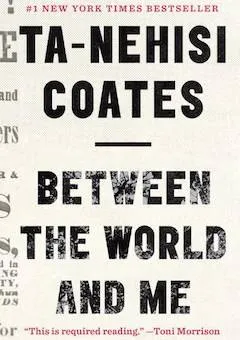
Who is it for?: Ta-Nehisi Coates On His Audience
 So instead of my usual tradition of watching Elf and drinking eggnog, I found myself wrapping Christmas presents while listening to the author of Between the World and Me speak about his powerful piece for The Atlantic on the end of President Obama’s administration, titled “My President Was Black”.
A single moment in the entire one hour and 45 minutes has stuck with me since. And it apparently has stuck with a lot of white people who consider themselves fans of Coates.
Klein brings up the success of Between the World and Me and Coates expresses the following:
So instead of my usual tradition of watching Elf and drinking eggnog, I found myself wrapping Christmas presents while listening to the author of Between the World and Me speak about his powerful piece for The Atlantic on the end of President Obama’s administration, titled “My President Was Black”.
A single moment in the entire one hour and 45 minutes has stuck with me since. And it apparently has stuck with a lot of white people who consider themselves fans of Coates.
Klein brings up the success of Between the World and Me and Coates expresses the following:
“No, no, no. First of all, I didn’t expect the book to be so successful. I just didn’t. Writers have to prepare themselves to not be read by a bunch of people. I had all my defenses up for that. I had no defenses for the idea that the biggest question about The World and Me would not be about my friend Prince Jones, who got killed; not about the communication between myself and my son; not about growing up in West Baltimore; but, why are so many white people reading this book? Literally whole articles written about what is going on here.
You feel yourself trying to write from an African-American perspective that is not fully represented, and in your mind, to the extend there is any audience, you see yourself as writing for African Americans who are like you, who are somewhat frustrated about things. The book is for them, in that sense, it’s for that feeling. It’s not that you don’t want other people to read it, but then the entire book becomes like that, about what white people think about it. Even as you try to write away from it.
I saw this SNL skit a couple weeks back called “The Bubble”, where you could retreat from Trump. And a signature of the bubble was a young white woman reading Between the World and Me. And that’s what it means to be in the bubble.
The black people in Harlem, in West Baltimore, in the south-side of Chicago, and in Washington, DC, who inspired that book, who empowered that book- they’re erased. They have no meaning for the interpretation of the book and what matters is white people reading the book. I’m not sure how to make sense out of that.
And a good portion of the “woke” white world lost it’s ever-lovin’ mind. I wont lie, my initial instinct was to feel hurt. I was concerned that my motives had been misconstrued. I fully admit to living in “the bubble.” It’s part and parcel of being raised white in this country. I want people to know I’m not a racist, that I absolutely abhor Donald Trump’s message of hate and fear… so I want to make sure you know I’m trying. I’m reading the right books. I’m following the right social justice warriors on Twitter. I’m having the hard conversations. It stung for a moment and then I realized that… he is absolutely right. If I wrote a book about my experience as a woman and from then on was only asked to engage in discussions about what my work meant for men, I’d be a rage monster. But the resulting backlash on Twitter made me realize just exactly what is wrong with publishing (and our society as a whole). In 2016, people of color are still being asked to create with only white people in mind. How will this work impact white people? What might they gain from it? Will it speak to them? In subsequent Twitter conversations, Coates points out that he has absolutely no problem with white people reading his book. And people who think that was ever in question, quite simply, weren’t listening. He argues, rightfully so, that it’s painful when you put so much of yourself out there for public consumption and then are unable to control that piece of your heart once it’s been removed from your chest and handed to the world. His book was a deeply personal letter to his son about the hurts he has suffered as a black man in a country that is supposedly founded on the idea of equal rights. However every news article, every interview, every conversation surrounding this work of art focused solely on the fact that it’s an important piece for white people to read. My experience with this interview came on the heels of an episode of NPR’s Code Switch podcast titled “Hold Up! Time for an Explanatory Comma.” Hari Kondabolu from Politically Re-Active joined hosts Gene Demby and Shereen Marisol Meraji for a discussion about how constrained they feel in having to perform explanatory asides for those members of their audience they believe just do not have the cultural background needed to fully engage in the conversation. This is such a widely accepted idea that Politically Re-Active has a regular feature called “Hold Up! Wait a Minute!” where they leave the present discussion for a minute to further explain concepts they think might be missed by the general populace. And as with most things, the cultural touchpoints that must be explained have to do with the non-white community. Gene, Shereen and Hari discussed whether or not they are responsible, as artists, to make sure their work is accessible to all listeners. The responsibility for education tends to fall on people of color in this country. The Twitter conversation that followed this episode included arguments for the fact that Code Switch exists solely to educate white people and therefore, the hosts have an obligation to ensure that we’re up-to-speed. But does it? Do shows like Code Switch or books like Between the World and Me exist entirely as an educational tool for white people? Is this idea why people of color are still struggling with adequate representation in the publishing world? Are publishers rejecting important works because the just don’t feel they’ll be able to effectively spin it as a gift to the white world? And what are we losing as a society each time that happens?








